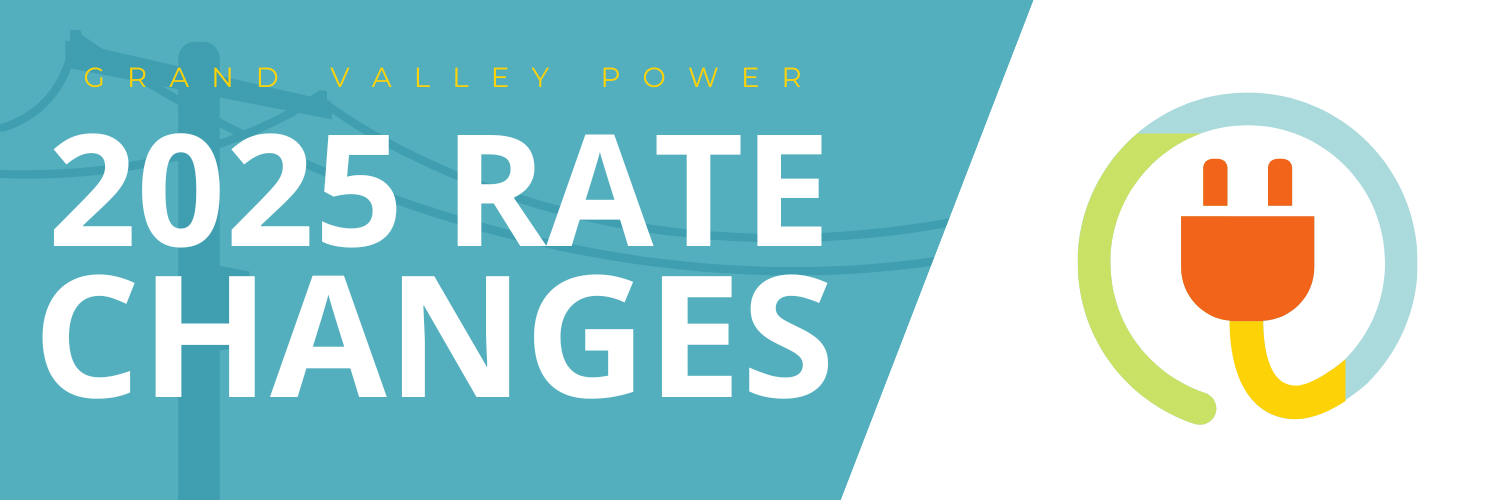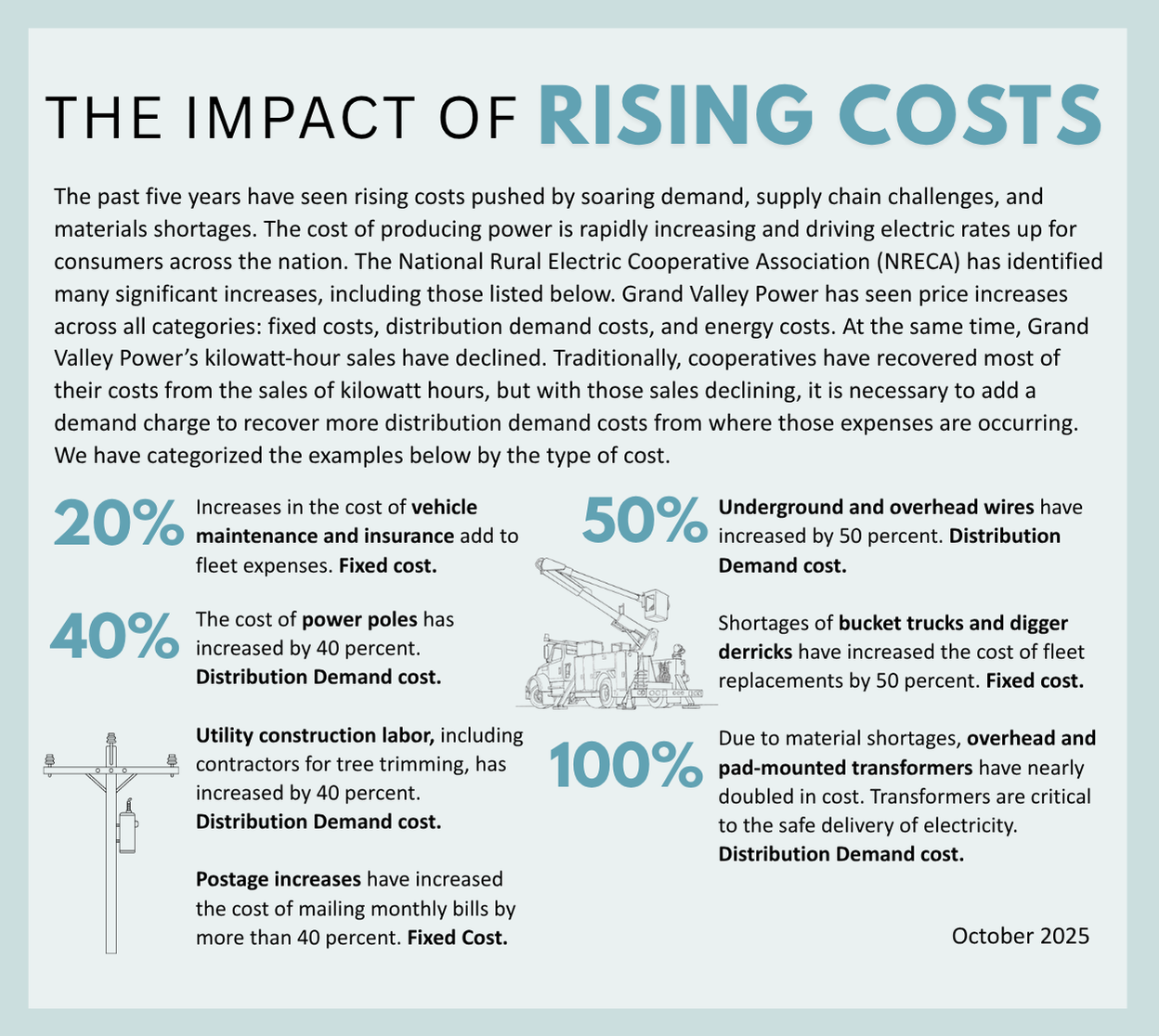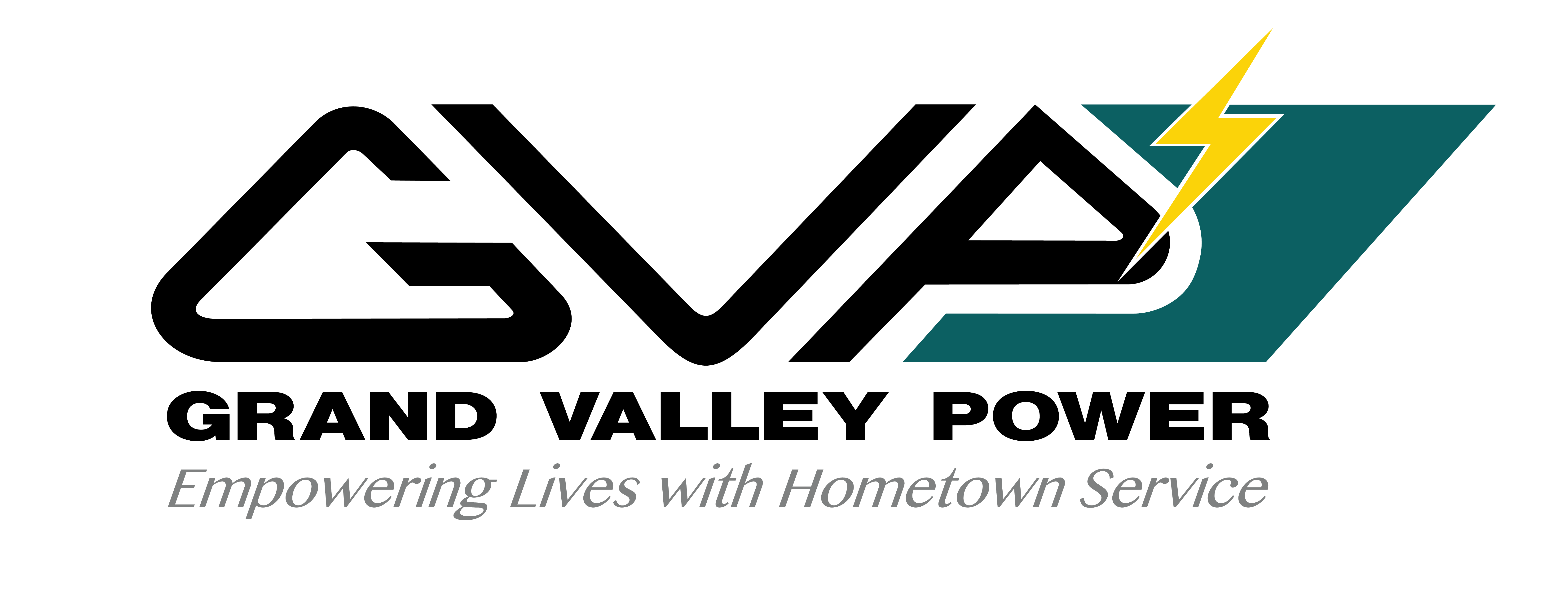
Notice of a Change in Tariffs
Grand Valley Rural Power Lines, Inc. (GVP) hereby provides notice of proposed changes to its Electric Vehicle Time-of-Use (EV-TOU) tariff to become effective January 1, 2026 (with first billing generated in February 2026) and to its General Service Time-of-Use (GS-TOU) tariff to become effective November 1, 2025 (with first billing generated in December 2025). GVP will revise its rates to recover costs to operate and maintain its distribution system. GVP proposes changes in the rate classes listed in the tables:

The “Electric Vehicle Time-of-Use” tariff is renamed “Electric Vehicle Time-of-Use/Demand” (EV-TOU/D). This classification is available to all residential consumers located on the Cooperative’s lines that own a qualified Electric Vehicle that is charged on the served premises, subject to the established rules and regulations of the Cooperative. Service under this schedule is limited to consumers whose load requirements do not exceed 50 kW. Tariff provisions regarding the monthly Power Cost Adjustment charge applicable to the rate classification listed above remain in place without revision. Read the full language of the proposed tariff changes. (PDF)

The “General Service Time-of-Use” tariff is renamed “General Service Time-of-Use/Demand” (GS-TOU/D). This classification is available to all consumers for single-phase service located on or near the cooperative's lines for all types of usage, subject to the established rules and regulations of the Cooperative. Service under this schedule is limited to consumers whose load requirements do not exceed 50 kW, and the capacity of individual irrigation pumps is limited to 10 horsepower. Tariff provisions regarding the monthly Power Cost Adjustment charge applicable to the rate classification listed above remain in place without revision. Read the full language of the proposed tariff changes. (PDF)
Questions or Concerns:
Consumers may direct questions or concerns about tariff changes by phone or by email to GVP. GVP will strive to respond to all inquiries received within two business days.
Phone: 970-242-0040
Email: ratechanges@gvp.org
Complaint Process:
Consumers wishing to complain about these proposed changes may do so as provided in GVP’s Consumer Complaint Procedures Policy, available on the GVP website at gvp.org/board-meetings-and-agendas. As noted in the policy, consumers wishing to complain should do so in writing, address the complaint to GVP’s CEO, include the complainant’s name and service address, note the complaint is being submitted under GVP’s Consumer Complaint Procedures Policy, provide information supporting the complaint, and indicate any desired resolution. Consumers may deliver the complaint by email to ratechanges@gvp.org or by U.S. Mail to 845 22 Road, Grand Junction, CO 81505, at least fourteen (14) days before the effective date.

FAQ
The “average” GVP consumer uses approximately 823 kilowatt hours per month, with 75% of that usage occurring during off-peak hours, with a demand of 7.7 kilowatts. This average consumer would see his or her bill increase by 4% per month.
The Grid Connectivity charge increases by $1.50 per month, the off-peak energy rate goes down, and the demand charge will add $1 per kW of demand to bills.
The GS-TOU rate change will go into effect November 1, 2025 and be reflected on December bills. The EV-TOU rate change will go into effect January 1, 2026 and be reflected on February bills. The last time Grand Valley Power increased rates was 2 ½ years ago. In the meantime, costs have escalated for everything from power poles and transformers to postage and contract labor for tree trimming. The Board of Directors postponed increasing rates as long as was feasible.
Grand Valley Power is a not-for-profit cooperative owned by you, the members, and governed by a Board of Directors elected by the membership. Your cooperative is accountable to consumer-members, not outside investors, and strives to provide the reliable power and exceptional hometown service that you expect at the lowest possible cost.
Your cooperative works to control expenses, but inflationary pressures over the past few years have raised the cost of delivering power to our members beyond what Grand Valley Power can control. A Cost-of-Service Study conducted this year by a consultant showed that
- Costs are rising,
- Revenue has declined due to fewer kilowatt-hour sales,
- And the number of consumers on Grand Valley Power’s system is growing.
This is not sustainable. It might be helpful to note that the last time Grand Valley Power adjusted its rates was in March 2023, and that the co-op did not change its Grid Connectivity fee. At that time, the co-op raised its energy charges to cover wholesale power cost and inflationary increases.
This time, rising costs are only part of the story. Another factor in the necessity of the rate change is declining kilowatt-hour sales. Grand Valley Power has enjoyed steady growth over the past several years. Logic would tell us that more members would mean higher kilowatt-hour sales to help cover the associated costs of a growing membership. But a noticeable trend is defying that logic. As membership grows, more households are generating their own power, mainly from solar. These consumers are buying fewer kilowatt hours from Grand Valley Power, leading to a noticeable decline in kilowatt-hour sales.
Grand Valley Power has different kinds of costs: fixed costs, demand costs, and energy costs. Rates must recover all these costs. Traditionally, most of these costs have been recovered through Grand Valley Power’s kilowatt-hour energy charges. But when consumers don’t buy kilowatt hours, they don’t help cover costs that are built into kilowatt hour charges. If we do not adjust rates, and we keep a disproportionate amount of fixed costs in the kilowatt-hour charges, 93% of consumers will see a bigger rate increase and pick up the slack for the other 7% who are buying fewer kilowatt hours.
The new rates will more effectively recover fixed, demand, and energy costs in a way that reflects how people use electricity.
Demand is the amount of power needed to supply every electrical device running in your home at one time. To ensure that you receive the electricity you need when you need it, cooperatives like Grand Valley Power must build their distribution system to supply all the electricity that its consumers demand at one time.
You can look at your past bills to see what your demand has been. It’s called Demand kW and is measured in kilowatts.
The Demand charge is designed to help pay for some of the co-op’s distribution demand costs. What are these costs? They are costs incurred in building our distribution system so that it can reliably provide all the power our members need when their need for power is the greatest. The biggest cost drivers are substations, distribution lines, and transformers. In 2025 Grand Valley Power wrapped up a $2.2 million upgrade to our Highline Substation to meet growing member demand. Upgrades to various other distribution lines and substations will be required in the near future. We need to have a way to pay for these improvements that is not tied to kilowatt hour sales. That’s why GVP’s new rates will include a Distribution Demand Charge.
According to the U.S. Energy Information Administration (EIA), the average cost of electricity per kilowatt hour (kWh) in Colorado was 0.1616 in June 2025. Residential electric rates have increased 6.7% in just the past year in Colorado. According to a survey conducted in July 2025 by the Colorado Association of Municipal Utilities (CAMU), Grand Valley Power is below average among Colorado cooperatives for the residential cost of 700 kWh at $116, and GVP is less than Xcel, which charges $121.
Members can keep electricity bills low by considering three factors: overall energy consumption, time of use, and demand.
Overall energy consumption. Our website offers tips for efficient energy use.
Time of use is also an important consideration. With Grand Valley Power’s Time of Use rates, members can save on their electric bills by shifting energy use to off-peak hours, before 4:00 p.m. and after 9:00 p.m. daily. (On-peak hours when rates are higher are 4:00-9:00 p.m.)
Demand is the third factor on your bill. You can control your demand — and charges associated with it – by limiting the number of electric devices you use at one time.
Want a bill credit?
If you haven’t already, check out our Shared Savings program. Members can help control the costs of providing safe and reliable electricity by signing up for paperless billing and automatic bank payments. Share the savings by completing our online enrollment form and signing up for these paperless options: gvp.org/sharedsavings
Programs are available for eligible consumers who need assistance with their electric bill. A list of resources is online: gvp.org/energy-assistance.
